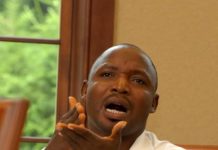Ibadan – The debate on the Value Added Tax (VAT) components of the Tax Reforms Bills shifted to the Nigeria Governors’ Forum (NGF) on Thursday.
The governors, who backed the four bills presented to the National Assembly by President Bola Ahmed Tinubu, proposed some adjustments “to ensure equitable distribution of resources”.
The VAT-sharing formula suggested by the governors is 50 per cent for equality, 30 per cent for derivation and 20 per cent for population.
The NGF proposal contradicts the Federal Government’s 20 per cent for equality, 60 per cent for derivation and 20 per cent for population contained in the bills.
At the NGF meeting held at Congress Hall, Transcorp Hilton Hotel, Abuja, chaired by Governor AbdulRahaman AbdulRazaq (Kwara), the governors said the adjustments, if adopted, would ensure equitable distribution of resources.
President Tinubu had during his maiden presidential chat reflected on the raging controversy over the VAT components of the bills.
He said although the tax reforms had come to stay, the Federal Government was open to negotiation.
A communiqué signed by AbdulRazaq said the governors supported the continuation of the ongoing legislative process at the National Assembly that will lead to the passage of the bills.
The communiqué reads: “We, members of the Nigeria Governors’ Forum (NGF) and presidential tax reform committee, at a meeting convened on the 16th of January 2025 to deliberate on critical national issues, including the reform of Nigeria’s fiscal policies and tax system, arrived at the following resolutions:
“The forum reiterated its strong support for the comprehensive reform of Nigeria’s archaic tax laws.
“Members acknowledged the importance of modernising the tax system to enhance fiscal stability and align with global best practices.
“The forum endorsed a revised Value Added Tax (VAT) sharing formula to ensure equitable distribution of resources: 50 per cent based on equality, 30 per cent based on derivation, and 20 per cent based on population.
“Members agreed that there should be no increase in the VAT rate or reduction in Corporate Income Tax (CIT) at this time, to maintain economic stability.
“The forum advocated for the continued exemption of essential goods and agricultural produce from VAT to safeguard the welfare of citizens and promote agricultural productivity.
“The meeting recommended that there should be no terminal clause for the Tertiary Education Trust Fund (TETFUND), the National Agency for Science and Engineering Infrastructure (NASENI), the National Information Technology Development Agency, (NITDA) in the sharing of development levies in the bills
“The meeting supports the continuation of the legislative process at the National Assembly that will culminate in. the eventual passage of the Tax Reform Bills.”
Other governors at the meeting were Inuwa Yahaya (Gombe), Uba Sani (Kaduna), Hope Uzodimma (Imo), Abdullahi Sule (Nasarawa), Amadu Fintiri (Adamawa), Caleb Muftwang (Plateau) and Usman Ododo (Kogi).
Sule said the grey areas in the bills had been resolved, noting that the tax reform would not lead to an increase in the already high inflation.
He said the new sharing formula being proposed by the NGF would positively affect the North.
“The agreement today has given equilibrium, as all governors, the Northern elites and the presidency, are on the same page,” he said.
The governor, who spoke with reporters, said the misinformation about the reforms was corrected, adding that the meeting resolved the knotty issues in a way that would be beneficial to the country.
Sule stressed: “The way it was presented today, it will affect the North positively.
“One of the things we in the North were agitated about was increasing VAT from 7.5 per cent to 10 per cent this year and then, to 12.5 per cent and then, to 15 per cent.
“We were concerned that by doing that, it was going to add to the high inflation of 34 per cent we are currently contending with. This 34 per cent is in Lagos. But in the North, it is far more than that. It may be around 50 per cent.
“This is because, in the North, we are not so lucky to have planned in the past for industries and people who can work.
“So, increased VAT would have affected the people more in the Northern region as prices of commodities and services will increase and that will further make life difficult for the people.
“I’m happy we presented that and the committee agreed with us”.
On the principle of inheritance, which was also a bone of contention, Sule said: “That is already in the existing law. There has been some misinformation as regards these Tax Reform Bills.”
He added that as against the current sharing formula that specifies 15 per cent for the Federal Government, the NGF proposed only 10 per cent for the Federal Government while 90 per cent will now go to states and local governments.
Chairman of the Senate Committee on Local Contents, Senator Natasha Akpoti-Uduaghan, explained why the North wanted an adjustment to the proposals.
Akpoti-Uduaghan, who represents Kogi Central District in the Senate, said the region was ill-prepared for the fiscal legislation.
She called for the revitalisation of Northern Nigeria’s socioeconomic and cultural heritage to boost the economic fortunes of the region.
Representatives of non-partisan, pan-Nigerian civil society organisations, including youth and student groups from across the seven states of Northwest Nigeria, at a symposium at Arewa House, Kaduna expressed their support for the proposed tax reforms bills.
A communique read at the end of the symposium by Comrade Hamza, National Coordinator of Nigeria First Project Initiative; Comrade Bishir Dauda Katsina, National Secretary of the Muryar Talaka Awareness Initiative and Sadi Garba, Coordinator of the Coalition of Northern Nigerian Students Forum, said the symposium was organised in response to the ongoing debates surrounding the tax reform bills.
Participants said the tax reform bills are a call to action for North’s leaders to explore innovative strategies for harnessing the region’s vast potential.

















